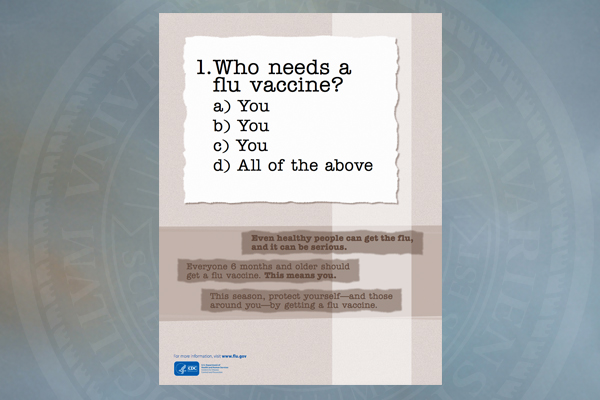
Get your flu shot now
Take precautions to protect yourself (and others) from flu
3:49 p.m., Jan. 14, 2015--This year's flu season has seen a high number of confirmed cases. According to the Centers for Disease Control and Prevention (CDC), flu activity is expected to continue in the coming weeks. The good news is there are several measures you can take to protect yourself and those around you.
Influenza A (H3N2) viruses are most common so far, and in this past this strain has been associated with more severe illness. There are early indications that this season may be severe, especially for people age 65 and older and young children. Other vulnerable populations include pregnant women, those who have recently given birth and people with underlying medical conditions, such as lung disease, heart disease, diabetes and weak immune systems.
FYI Stories
June 6: UDid It! Picnic
2FA protects you
Dr. Timothy Dowling, director of Student Health Services, says that the best protection is to get a flu shot and to take care washing hands and covering coughs and sneezes.
"We're advising students, faculty and staff who have not already gotten the flu vaccine to do so as soon as possible, so we'll be better protected for the spring semester when everyone returns to campus," Dowling said.
"This year's vaccine has not been as effective as in some previous years, but that doesn't mean you should not get the vaccination," he said. "If you do get the flu after having the vaccination, you will have a milder case and be able to recover more quickly.
"It is particularly important for people who are caregivers for youngsters or older people to be vaccinated," he added.
Delaware Public Health (DPH) has issued the following recommendations for protecting yourself from the flu:
• Get the flu vaccine. Vaccinations are offered through physician offices, pharmacies and grocery stores. Visit the HealthMap Vaccine Finder to locate where you can get flu vaccine. On campus, students may contact Student Health Services at 302-831-2226, and employees may contact the Nurse Managed Health Center at 302-831-3195.
• Wash hands with soap frequently or use alcohol-based hand sanitizers, especially after coughing, sneezing or touching your face. On campus, hand sanitizer stations are available at key locations, including all dining halls, the Carpenter Sports Building, the Bob Carpenter Center, the Trabant University Center, the Perkins Student Center and the Morris Library.
• Cover coughs and sneezes with a tissue and dispose of the tissue immediately. If a tissue is not available, cough or sneeze into your inner elbow. Droplets from a sneeze can travel up to 6 feet.
• Stay home when sick and do not return to class or work until 24 hours after a fever is gone.
On campus, students who become sick with flu are advised to stay in their rooms and not attend classes for three days. Students who have a dining plan may arrange to have a meal prepared at one of the dining halls to be picked up by a roommate or friend. For details, download this PDF.
To prevent the spread of flu germs, those who use the facilities at the Carpenter Sports Building are reminded that it's a good idea to wipe down the equipment before you use it and afterward.
Managers in Facilities have reminded all custodial workers to pay special attention to door handles and other areas that are frequently touched.
If you get the flu
If you do get the flu, DPH recommends these five steps:
• Stay home and rest.
• Avoid close contact with well people.
• Drink plenty of water and other clear liquids to prevent dehydration.
• Treat fever and cough with medicines you can buy at the store.
• If you get very sick or are in a high risk group, call your doctor.
When to seek medical attention
According to the CDC, the following signs in adults suggest severe illness from flu requiring immediate medical attention:
• Difficulty breathing or shortness of breath,
• Pain or pressure in the chest or abdomen,
• Sudden dizziness,
• Confusion,
• Severe or persistent vomiting and
• Flu-like symptoms that improve but then return with fever and worse cough.
For further information on the flu, visit flu.delaware.gov.
Graphic courtesy of Centers for Disease Control and Prevention








